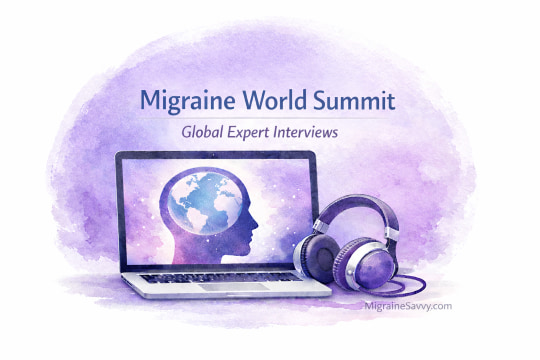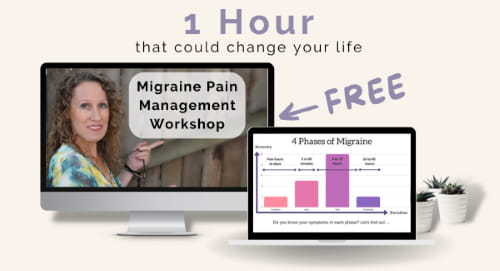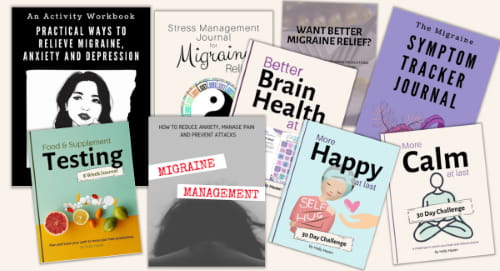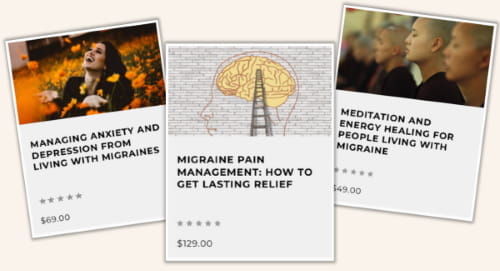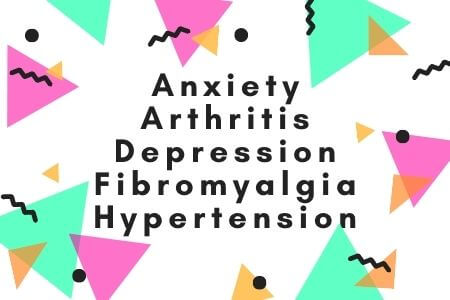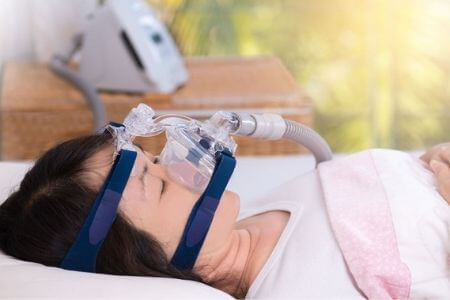- Home
- Associated Conditions
- Migraine With Stroke Like Symptoms
Migraine with Stroke Like Symptoms: Recognize, Respond, and Stay Safe
Living with migraines is challenging enough, but experiencing migraine with stroke like symptoms alongside them can be downright terrifying. You’re not alone - many migraine sufferers worry about mistaking migraine symptoms for a stroke or vice versa. Knowing the difference between these conditions isn’t just helpful; it could be lifesaving. By reading this you'll learn to recognize key distinctions, understand your unique risk factors, and know when to seek emergency care.
Let’s walk through what you need to know about migraines that mimic stroke symptoms, including how to protect your health and reduce your risks.
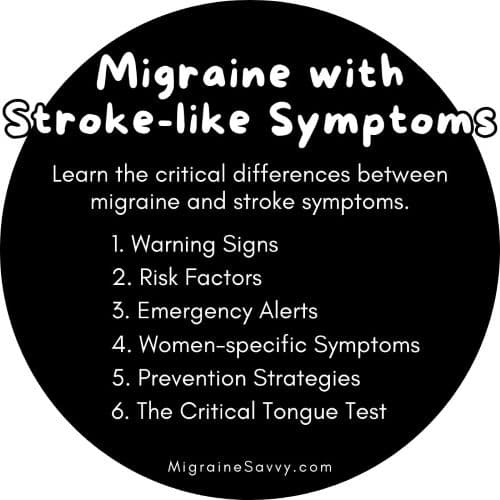 Migraine with stroke-like symptoms? Learn how to act F.A.S.T.
Migraine with stroke-like symptoms? Learn how to act F.A.S.T.⚠️ EMERGENCY WARNING
If you experience sudden onset of any stroke symptoms, call emergency services immediately:
- United States: 911
- Australia: 000
- Europe: 112
REMEMBER F.A.S.T.
Remember the F.A.S.T. Test for Stroke:
- Face: ask them to smile. Does one side droop?
- Arms: can they raise both arms? Does one drift down?
- Speech: is their speech slurred or strange?
- Time: every minute counts - call emergency services immediately (T = Tongue Test too!)
A stroke is always a medical emergency. Call your local emergency number like 911. Do not wait or attempt to drive to the hospital on your own. Do not eat or drink anything.
Migraine, particularly with aura, can share these similar symptoms with a stroke: numbness, visual changes, or even trouble speaking. But there are important differences in how these symptoms present.
If you need a deeper breakdown of how visual and sensory aura develops and gradually spreads, read → Auras and Migraines: Symptoms, Risks, and Treatments.
Migraine with aura often follows a predictable sequence and develops gradually, whereas strokes tend to come on suddenly and severely. Knowing how to recognize these differences is essential, especially if you or someone close to you suffers from recurring migraine attacks.
Let's explore this now in greater detail so you are prepared for the worst-case scenario.
Understanding the Key Differences Between Migraine and Stroke Symptoms
Gradual vs. Sudden Onset: A Key Difference Between Migraines and Strokes
The onset of symptoms is one of the most telling differences between a migraine with stroke-like symptoms and an actual stroke. Migraines, particularly those with aura, usually develop slowly, starting with a visual disturbance or a tingling sensation that may spread from one area to another.
Strokes, on the other hand, tend to be sudden. You’ll often hear people describe stroke symptoms as "out of nowhere," with severe symptoms appearing in seconds or minutes.
Key takeaway: if symptoms develop slowly, it may be a migraine. If they hit suddenly, think stroke, and seek emergency help.
Key Statistics:
Research consistently shows that migraine with aura carries a modest but measurable increase in vascular risk, which is why understanding the difference between migraine with stroke like symptoms and a true stroke matters.
- 25% of people living with migraine experience aura
- Women over 45 with migraine may have double the stroke risk
- Migraine with aura increases stroke risk by 2-3 times
- Recognizing patterns can reduce emergency room visits by 50%
Critical Differences
Migraine Pattern:
- Symptoms typically develop gradually
- Follow a predictable pattern unique to the individual
- Usually have recognizable triggers
- Visual disturbances often progress in a specific sequence
Stroke Pattern:
- Symptoms appear SUDDENLY
- No warning or buildup
- Often accompanied by complete one-sided weakness
- Symptoms don't "travel" through the body
Learning to recognize your body's specific signals for an incoming migraine can make all the difference, especially when it comes to migraine with stroke like symptoms. Being mindful from the beginning helps you prepare and respond more effectively to your unique pattern of symptoms.
For instance, my early warning signs typically start as a slow-building pain behind my eyes or neck, and this discomfort gradually escalates over the next three hours. But unlike the steady onset I usually experience, migraine with stroke like symptoms can appear suddenly, often mirroring the abrupt nature of an actual stroke.
When we talk about strokes, it’s essential to understand that they result from a sudden disruption in blood flow to the brain, often due to a blockage or a blood vessel bleeding. This interruption can lead to brain damage within minutes, affecting areas that depend on the compromised blood supply. The severity of stroke effects varies greatly depending on how much brain tissue is involved and how quickly blood flow can be restored.
Stroke symptoms often appear without warning, typically manifesting in seconds or minutes. However, in some cases, symptoms can develop gradually, starting with mild dizziness, tingling, or weakness that increases over a few hours. A person might even notice subtle changes in balance or coordination.
If you notice any sudden or unexplained symptoms like these, it’s critical to consult a healthcare provider immediately. These changes could be due to another migraine or signs of aging, but they could also indicate something more serious.
How Migraine Aura Symptoms Can Resemble Stroke Symptoms
Recognizing Common Triggers and Patterns in Migraine Aura
Migraines with aura often start with recognizable signs, like shimmering lights, blind spots, or zigzag patterns in your vision. You might feel a tingling sensation that gradually moves from your hand up your arm. Knowing your usual migraine pattern is essential - it helps you differentiate a typical migraine from something more serious.
Triggers for migraine with aura often include:
- Bright or flickering lights
- Lack of sleep
- Stress or emotional upheaval
- Certain foods, such as caffeine or aged cheeses
If you recognize these triggers, it’s another clue that your symptoms could be migraine related.
Unique Signs of Stroke to Watch For
While migraines and strokes can share some symptoms, strokes have distinct signs. These include sudden, complete weakness or numbness on one side of the body, drooping of one side of the face, and difficulty speaking clearly. Unlike a migraine, stroke symptoms do not usually move around the body or develop gradually.
Quick Tip: familiarize yourself with the F.A.S.T. signs below to help spot a stroke fast.
When to Seek Emergency Care
Stroke Symptoms to Watch For
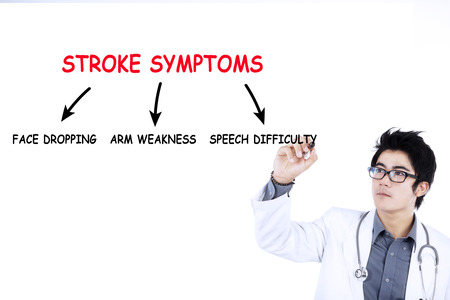 F.A.S.T. = Face, Arm, Speech, Time
F.A.S.T. = Face, Arm, Speech, TimeFace drooping, Arms drifting down, Speech difficulties, Time to call emergency services.
If you or someone around you experiences sudden symptoms, act quickly. Use the F.A.S.T. test to check for signs of a stroke and get help immediately:
- Face: Can you smile or is one side of your face drooping?
- Arm: Can you raise both arms or does one drift downward?
- Speech: Is your speech slurred or strange?
- Time: Every minute counts - call emergency services immediately. (T can also = Tongue test)
Critical Diagnostic Tongue Test
The tongue test is an important diagnostic check. Ask the person to stick out their tongue. If it deviates to one side, this could indicate a stroke and requires immediate medical attention.
- Normal: Tongue extends straight out.
- Stroke Warning: Tongue deviates to one side.
- Action Required: If tongue deviates, call emergency services.
Additional Sudden Stroke Symptoms
Other stroke symptoms can appear unexpectedly, including:
- Sudden numbness, weakness, or tingling on only one side of your body. It could also present as a loss of movement in your face, arm, or leg, on one side of your body.
- Sudden vision changes, including loss of vision in one or both eyes.
- Sudden difficulty speaking and forming words.
- Sudden unexpected confusion or trouble understanding simple statements.
- Sudden dizziness or problems walking.
- A sudden, severe headache that is different from any of your past headaches or migraines. Often described as "the worst headache of my life."
Some symptoms such as sudden dizziness can overlap with vestibular migraine, you can read more about how to distinguish these in Can a Migraine Cause Vertigo.
Recognizing and understanding these warning signs can help you respond quickly and make the best decision. A stroke is always a medical emergency and requires urgent medical attention. Even if you suspect a migraine, it’s better to be safe and seek help.
→ Learn Your Migraine Early Warning Signals
Migraine With Stroke Like Symptoms: Side-by-Side Comparison
Migraine with Aura Progression:
- Symptoms move sequentially through the body
- Usually starts with visual disturbances
- May affect speech temporarily
- Typically resolves within 20-60 minutes (the aura not the whole migraine episode)
- Follows familiar patterns for the individual
Stroke Symptoms:
- Sudden onset
- Complete side affected at once
- Face drooping (particularly noticeable)
- Persistent symptoms
- Different from previous experiences
Key Symptoms Comparison Chart
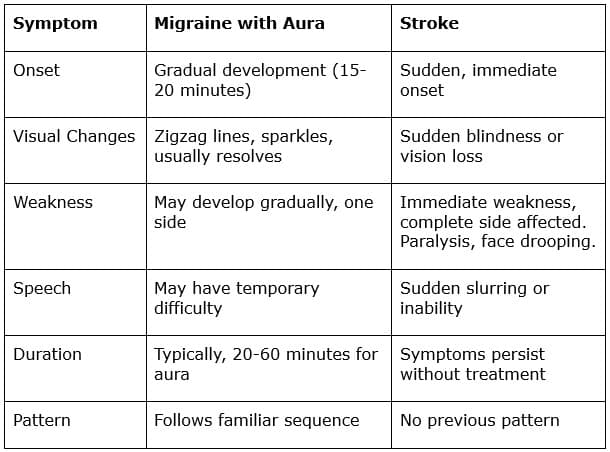 This chart can be a quick reference for you to compare and distinguish the symptoms.
This chart can be a quick reference for you to compare and distinguish the symptoms.
Here are a few more examples:
Hemiplegic Migraine Symptoms
Aura Symptoms:
- muscle weakness causing temporary paralysis on one side of your body (hemiplegia) which can include your arm, leg, and half of your face
- Severe, throbbing pain, often on one side of your head
- A pins-and-needles feeling, often moving from your hand up your arm
- Numbness on one side of your body
- Loss of balance and coordination, dizziness or vertigo
- Nausea and vomiting
Problems with your senses, communication, and drowsiness:
- Seeing zigzag lines, double vision, or blind spots
- Extreme sensitivity to light, sound, and smell
- Language difficulties, such as mixing words or trouble remembering a word
- Slurred speech
- Confusion
- Loss of consciousness or coma (rare) [5]
Stroke Signs
SUDDEN...
- Weakness or numbness or paralysis of the face, arm or leg on either or both sides of the body
- Difficulty speaking or understanding
- Dizziness, loss of balance or an unexplained fall
- Loss of vision, sudden blurring or decreased vision in one or both eyes
- Headache, usually severe and abrupt onset or unexplained change in the pattern of headaches
- Difficulty swallowing [3]
Migraine with Aura (MWA)
- A migraine with aura will move. It will start on one side of face, you'll get visual disturbance, your tongue will be affected... then your arm and then down to your leg. [4]
- It should take 20 minutes and go away. [4]
Stroke Signs
- A stroke will cause numbness on a whole side of the body. Complete at the same time. [4]
Make sure you know your migraine history and note if it’s the same or not. "The real key is in the history."
~ Dr. Allan Purdy [4]
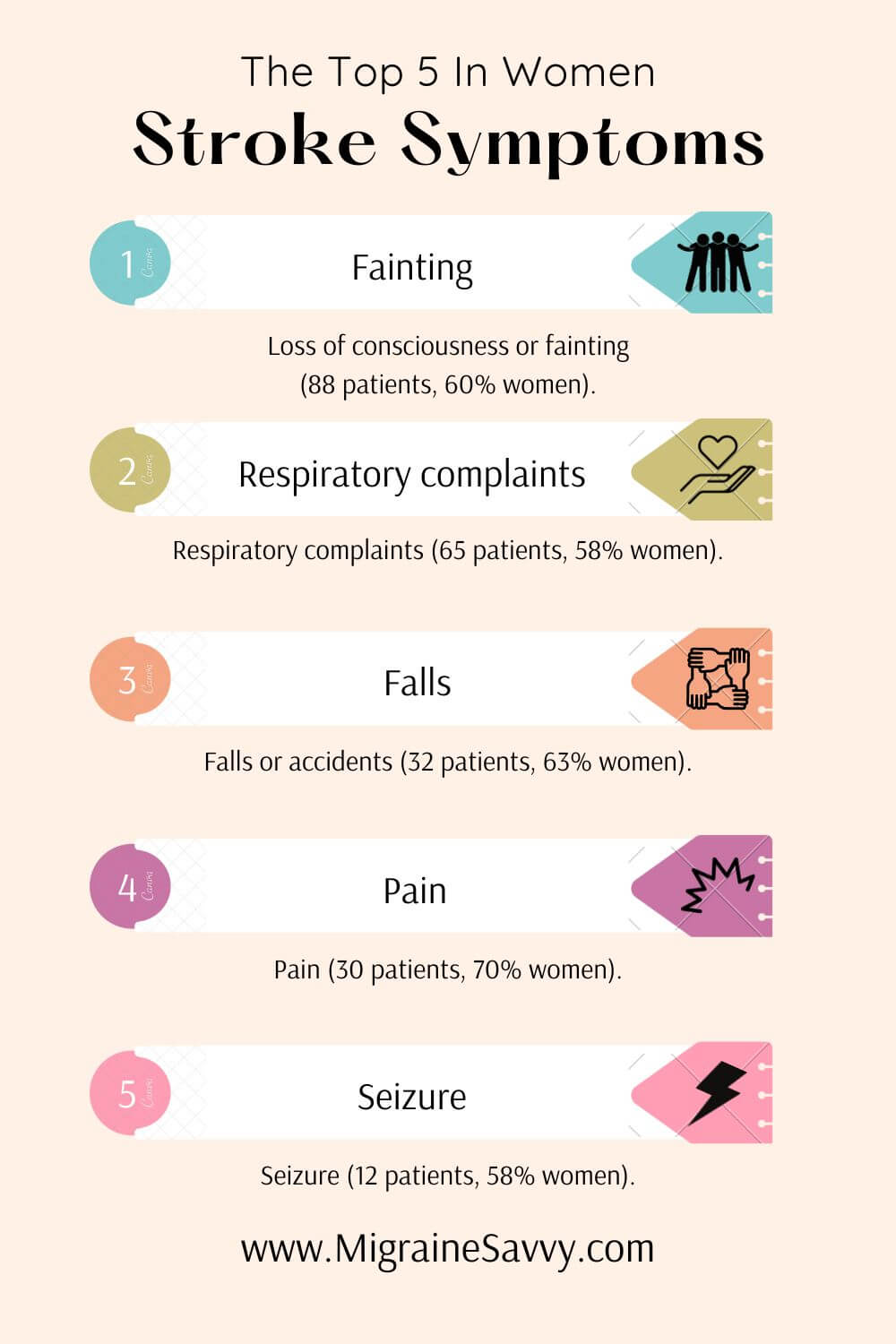 Here are the top 5 atypical stroke symptoms reported in women
Here are the top 5 atypical stroke symptoms reported in womenWomen-Specific Warning Signs
Women often experience different stroke symptoms than men, making diagnosis more challenging. Research shows these unique (atypical) presentations:
1. Sudden Unexplained Symptoms:
- Loss of consciousness or fainting (60% of cases)
- Breathing difficulties (58% of cases)
- Sudden falls or accidents (63% of cases)
- Unexplained pain (70% of cases)
- Seizure-like episodes (58% of cases)
2. Additional Female-Specific Risk Factors:
- Hormonal birth control use
- Pregnancy and postpartum period
- Menopause transition
- History of complicated pregnancies
Risk Factors and Prevention
Migraine with stroke like symptoms — particularly migraine with aura — comes with certain risk factors that can overlap with those for strokes. Identifying and managing these factors is an important step in protecting your health.
Known Risk Factors:
- History of migraine with aura
- High blood pressure
- Smoking
- Hormonal birth control
- Age (particularly over 45)
- Previous cardiovascular issues
Prevention Strategies: Protecting Yourself from Stroke and Migraine Risks
- Regular blood pressure monitoring
- Avoid smoking
- Daily exercise routine
- Maintain a balanced heart-healthy diet
- Practice stress management techniques
- Stay hydrated (8 glasses daily)
- Regular sleep schedule
- Limited alcohol consumption
WHEN TO SEEK EMERGENCY CARE REMINDER
Seek immediate medical attention if you experience:
- Any sudden, severe symptoms
- Symptoms different from your usual migraine pattern
- Face drooping
- Complete weakness on one side
- Sudden confusion or difficulty speaking
- Vision loss in one or both eyes
Managing Your Risk
Daily habits can make a big difference in reducing the frequency of migraines and lowering stroke risk. Here are some practical ways to manage your health.
Daily Prevention Tips:
- Keep a symptom diary: document your migraine triggers and typical symptoms to notice patterns. My structured Symptom Tracker Journal can make this easier.
- Share your migraine history with family and friends so they know what’s normal for you.
- Create an emergency plan: have contact numbers ready and educate those around you on how to respond if symptoms escalate.
- Consider daily low-dose aspirin (only under a doctor’s supervision), which may help reduce stroke risk.
- Practice stress reduction techniques: even a few minutes of relaxation daily can help lower blood pressure and stress-related triggers.
- Establish regular sleep patterns - the migraine brain loves routine.
P.S. Do not underestimate the value here of making healthy lifestyle choices. One small thing can make one huge difference!
Learn Directly from Leading Migraine Specialists
Migraine research continues to evolve. New insights into symptoms, risk factors, prevention strategies, and treatment options are emerging every year.
If you want to understand migraine more deeply — whether you struggle with aura, vertigo, chronic attacks, or treatment decisions — learning directly from experienced specialists can make a significant difference.
Each year, the Migraine World Summit interviews over 30 leading neurologists, researchers, and headache specialists who share practical, evidence-based guidance on managing migraine more effectively.
The event streams free for one week each year, with optional lifetime access if you prefer to watch at your own pace.
→ Learn more about the Migraine World Summit
If you want structured, practical support between doctor visits — especially if fear of stroke-like symptoms leaves you anxious during attacks — my Migraine Pain Management Course walks you through exactly how to apply what you’re learning.
→ Explore the Migraine Pain Management Course
Migraine With Stroke Like Symptoms FAQ
Click on the arrow below for the answer to appear.
Can a migraine cause a stroke?
Can a migraine cause a stroke?
Answer: Migraines themselves don’t directly cause strokes, but people with migraine with aura do have a slightly increased risk of stroke. Managing other risk factors can help mitigate this risk.
How can I tell if it's a migraine or stroke?
How can I tell if it's a migraine or stroke?
Answer: The key difference is suddenness - a stroke typically occurs suddenly, while a migraine usually develops gradually and follows a familiar pattern. Learn how migraine progresses through the 4 phases of migraine here.
Are women at higher risk for migraine-related strokes?
Are women at higher risk for migraine-related strokes?
Answer: Yes, women over 45 who experience migraine with aura may face double the stroke risk. Hormonal factors, such as birth control and pregnancy, can add to this risk.
Should I go to the emergency room for every severe headache with these symptoms?
Should I go to the emergency room for every severe headache with these symptoms?
Answer: If your symptoms are sudden, severe, or different from your usual pattern, seek emergency help. It’s better to err on the side of caution.
Final Thoughts: Stay Informed and Stay Safe
Understanding how to distinguish between a migraine with stroke like symptoms and an actual stroke can give you peace of mind. By learning these signs, keeping track of your patterns, and managing your risk factors, you’ll be better equipped to act confidently and take action when needed. Always consult your healthcare provider to tailor prevention and care strategies to your needs.
Stay informed, stay safe, and take steps today to protect your health for the future.
Disclaimer: This article is for informational purposes only and should not replace professional medical advice. Always consult with healthcare providers for diagnosis and treatment decisions.
Ready to take the next step?
Choose the next step that fits where you are right now.
ASSOCIATED CONDITIONS Related Articles
Migraine with Stroke Like Symptoms References:
1. WebMD. Stroke Symptoms. Available [online] at: https://www.webmd.com/stroke/tc/stroke-symptoms.
2. Phend, C. staff writer for MedPage Today. Atypical Stroke Symptoms in Women. Available [online] at: https://www.medpagetoday.com/MeetingCoverage/ISC/5022
3. American Stroke Organisation. Warning Signs of Stroke. Available [online] at: https://www.stroke.org/en/about-stroke/stroke-symptoms Updated Nov. 4, 2024
4. Purdy, Dr. A (2018) Migraine World Summit. Available [online] at: https://www.migrainesavvy.com/summit
5. WebMD. Hemiplegic Migraine Headaches. Available [online] at: https://www.webmd.com/migraines-headaches/hemiplegic-migraine-headaches-symptoms-causes-treatments#1
Migraine with stroke like symptoms updated Mar. 3, 2026
